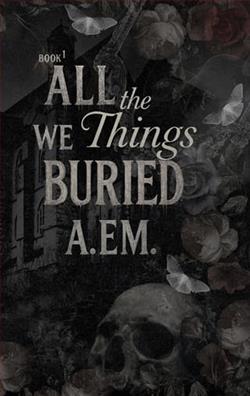Page 37 of So Far Gone
Then came anotherpop, maybe a minute after the first, then anotherpopright after that, possibly from different guns.
He opened his eyes. Leah was staring at him. “Are those—”
“Gunshots,” Asher said authoritatively. It was quiet, all of them listening, and then Asher said, “They do target practice sometimes.”
“Right,” Kinnick said, “they’re probably doing target practice.” He and Leah kept their eye contact.
Decision time. He could not go back. Not with the kids. Should he turn north, toward Canada? Go to Sheriff Glen Campbell’s office, ten miles away? Or go south, toward Spokane, and escape? Kinnick wished for the fiftieth time in the last two days that he had a cell phone. He could call for help. Or call Chuck and ask if he needed to come back and get him.
And just as he thought this, he noticed, in a cupholder between the seats, Chuck Littlefield’s iPhone. Wait. So... Chuck had stood alone against those militia nutjobs, with only his glove box handgun and no phone?
Kinnick grabbed the phone. He touched the screen and saw the date and time above a photo of Lucy and Chuck, cuddled in front of a fire. Each of them held a glass of red wine. He wasn’t sure he’d ever seen Lucy look that happy before.
He tapped the screen, then tapped it again. He tried to rememberhow these things worked. He turned it over, like a caveman with a garage door opener.
“Do you know his password?” Leah asked.
Kinnick slammed the phone back in the cupholder. Of course he didn’t know the man’s password! Chuck’s last word to him had been:Go!
So... he needed to go. Kinnick stepped on the gas, spinning tires in the dirt. He turned the truck to the south, toward Spokane, civilization, escape.
As he drove, Kinnick kept checking the rearview mirror, but the only vehicle behind him was a big logging truck. How long would it be safe to stay on this highway? And if he turned, where would he go? With National Forest land on either side, there weren’t any cutoffs until Sandpoint. At least twenty miles away.
On a long straightaway he checked the rearview mirror again. A pickup had emerged behind the logging truck. He wished he could recall the models and colors of the trucks at the Rampart, but he’d been too nervous to take note. This pickup didn’t seem to be gaining on the logging truck, though. So, it was probably okay. Or was it?
Great, so now he was going to be afraid—
—of every pickup he saw—
—in North Idaho!
“You’re driving pretty fast,” Asher said.
Kinnick looked down. He was going eighty-four miles per hour.
“I guess I am,” Kinnick said. He eased off the gas.
“I wonder,” Asher said, “how long are we going to be with you?”
Kinnick looked over at the boy. “What?”
“I was just wondering how long we’re going to be with you.”
“I don’t think we know yet.”
“Like a week? Or just a few days? Or a month?”
The calendar usually meant so little to Kinnick that he had to concentrate, to visualize the flow of days. Seasons were what mattered to him now. So, let’s see: Bethany had apparently left on Saturday. Thekids had shown up at his place yesterday, which was a Monday. It was Tuesday afternoon.Wouldhe still have them in six days? Ten? Thirty?
“I don’t know, Asher, why do you ask?”
“Because I was just wondering—”
“Asher—” Leah said her brother’s name not with irritation, but with fatigue.
He spoke louder. “I was just wondering! If we could go back and tell that minister that I want to sign up for the youth tournament? Make sure I get a spot?”
Kinnick took a deep breath. “We’ll do that. Don’t worry, Asher. We’ll have you playing chess soon. And I’ll get a board up at my place. You can practice by beating me.”















